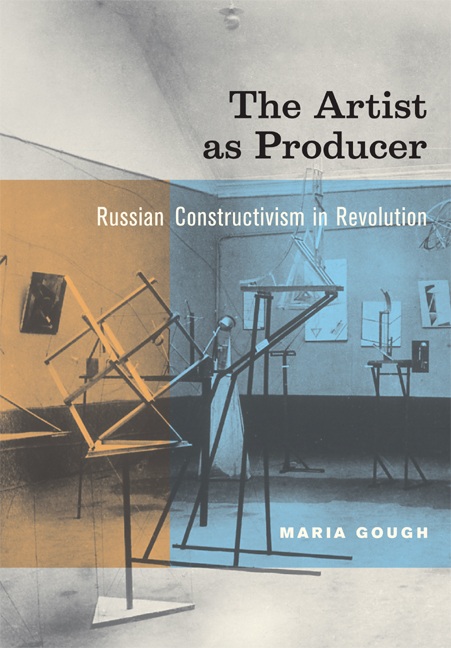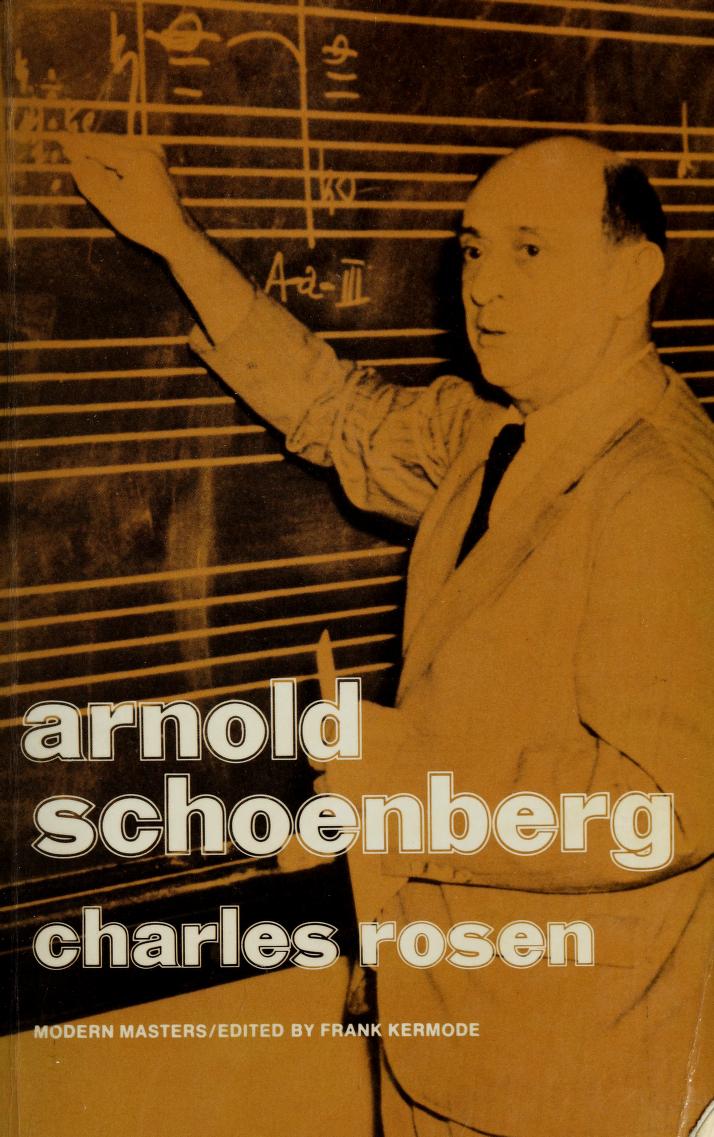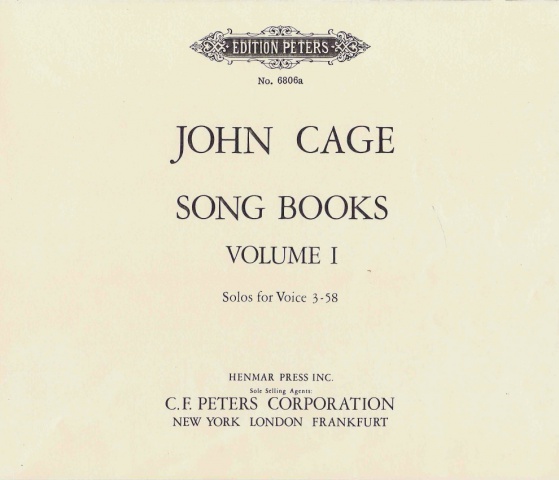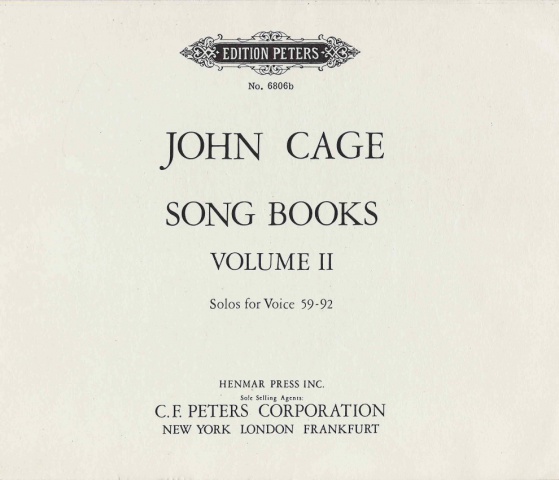Maria Gough: The Artist as Producer: Russian Constructivism in Revolution (2005)
Filed under book | Tags: · 1920s, architecture, art, art history, art theory, avant-garde, communism, composition, constructivism, electricity, formalism, functionalism, politics, productivism, revolution, russia

“The Artist as Producer reshapes our understanding of the fundamental contribution of the Russian avant-garde to the development of modernism. Focusing on the single most important hotbed of Constructivist activity in the early 1920s—the Institute of Artistic Culture (INKhUK) in Moscow—Maria Gough offers a powerful reinterpretation of the work of the first group of artists to call themselves Constructivists. Her lively narrative ranges from famous figures such as Aleksandr Rodchenko to others who are much less well known, such as Karl Ioganson, a key member of the state-funded INKhUK whose work paved the way for an eventual dematerialization of the integral art object.
Through the mining of untapped archives and collections in Russia and Latvia and a close reading of key Constructivist works, Gough highlights fundamental differences among the Moscow group in their handling of the experimental new sculptural form—the spatial construction—and of their subsequent shift to industrial production. The Artist as Producer upends the standard view that the Moscow group’s formalism and abstraction were incompatible with the sociopolitical imperatives of the new Communist state. It challenges the common equation of Constructivism with functionalism and utilitarianism by delineating a contrary tendency toward non-determinism and an alternate orientation to process rather than product. Finally, the book counters the popular perception that Constructivism failed in its ambition to enter production by presenting the first-ever case study of how a Constructivist could, and in fact did, operate within an industrial environment. The Artist as Producer offers provocative new perspectives on three critical issues—formalism, functionalism, and failure—that are of central importance to our understanding not only of the Soviet phenomenon but also of the European vanguards more generally.”
Publisher University of California Press, 2005
ISBN 9780520226180
xi+257 pages
Reviews: Paul Wood (Art Journal, 2006), Charlotte Douglas (Modernism/modernity, 2006), Elizabeth Kridl Valkenier (Russian Review, 2006), Patricia Railing (Slavic Review, 2007), Douglas Greenfield (Slavic and East European Journal, 2007), Roann Barris (SECAC Review, 2007).
PDF (21 MB, no OCR)
Comment (1)Charles Rosen: Arnold Schoenberg (1975)
Filed under book | Tags: · biography, composition, expressionism, music, music history, music theory, serialism

In this lucid, revealing book, pianist and scholar Charles Rosen sheds light on the elusive music of Arnold Schoenberg and his challenge to conventional musical forms. Rosen argues that Schoenberg’s music, with its atonality and dissonance, possesses a rare balance of form and emotion, making it, according to Rosen, “the most expressive music ever written.” Concise and accessible, this book will appeal to fans, non-fans, and scholars of Schoenberg, and to those who have yet to be introduced to the works of one of the greatest composers of the twentieth century.
Publisher Viking Press, New York, 1975
ISBN 06701331617
113 pages
Review (Joel Sachs, The Musical Quarterly, 1977)
Review (Joseph Horowitz, Music Journal, 1976)
Review (Robert Craft, The New York Times, 1975)
PDF (17 MB, no OCR)
More works by and on Schoenberg (Monoskop wiki)
John Cage: Song Books (Solos for Voice 3-92) (1970)
Filed under musical score | Tags: · composition, music


In Song Books, John Cage “paid fascinating tribute to Thoreauvian anarchism. The 319-page, two-volume score consists of [90] short vocal solos composed by 50 different methods. Cage used chance operations throughout—to decide the number of songs, the particular composition technique (transparency, star chart)—leaving behind hundreds of pages of outlines. The song texts range all over: bits from current newspapers (‘POLICE SET UP ROADBLOCKS’); tributes to Satie and Duchamp; quotations from Fuller, Brown, McLuhan; passages in Japanese, French, German, Polish, Spanish; textless melodic lines to vocalize or hum.
But Cage’s literary-musipolitical sprawl keeps returning to Thoreau. The score includes such material as a portrait of Thoreau (Solo 5) and a map of Concord (Solo 3), to be wandered over in order to suggest a melodic line; a description of Thoreau’s nature walks (Solo 4); and remarks from Thoreau’s journal about the telegraph harp (Solo 17), as well as syllable mixes from the journal (Solo 85). The score also calls for showing twenty-two Thoreau-related slides and presenting something by Thoreau as a gift to some member of the audience.
Cage’s most emphatic invocation of Thoreau, however, is the lengthy Solo 35. Its eleven pages of text essentially repeat again and again, in slightly different verbal and rhythmic arrangement, the opening declaration of Civil Disobedience: ‘The best form of government is no government at all’. Cage called for Thoreau’s words to be rhapsodized. His instructions read: ‘Sing in an optomistic [sic] spirit. .. Before singing this solo, raise either the black flag of Anarchy or the flag of the Whole Earth .. do not lower it at any time during the performance.’
Cage’s Song Books most effectively raises the Thoreauvian flag of anarchy by acting it out. In a sort of indeterminacy gone wild, singers are free to choose to perform any number of any solos they wish for any length of time in any order—accompanied, if they wish, by other indeterminate music, such as the Concert for Piano and Orchestra. They also freely choose their own costumes, and sometimes their own words and pauses—one performer not more important than another, each doing his or her own thing. Having created this uncompetitive model of ‘practical global anarchy’, Cage laughingly said that it was nearly impossible to consider Song Books a work of art: ‘Who would dare? It resembles a brothel, doesn’t it?'” (from Kenneth Silverman, Begin Again: A Biography of John Cage, 2010)
Publisher Henmar Press, New York, 1970
319 pages
First complete recording of Song Books (Sub Rosa, 2012)
Choreographic interpretation of 15 selected songs (video, 1h, c2013)
Volume 1: Solos for Voice 3-58 (removed on 2024-9-12 upon request from Edition Peters)
Volume 2: Solos for Voice 59-92 (24 MB)
Note: There was also a third volume published. Entitled “Instructions” it contains various tables and other materials necessary for performance of some of the pieces.

